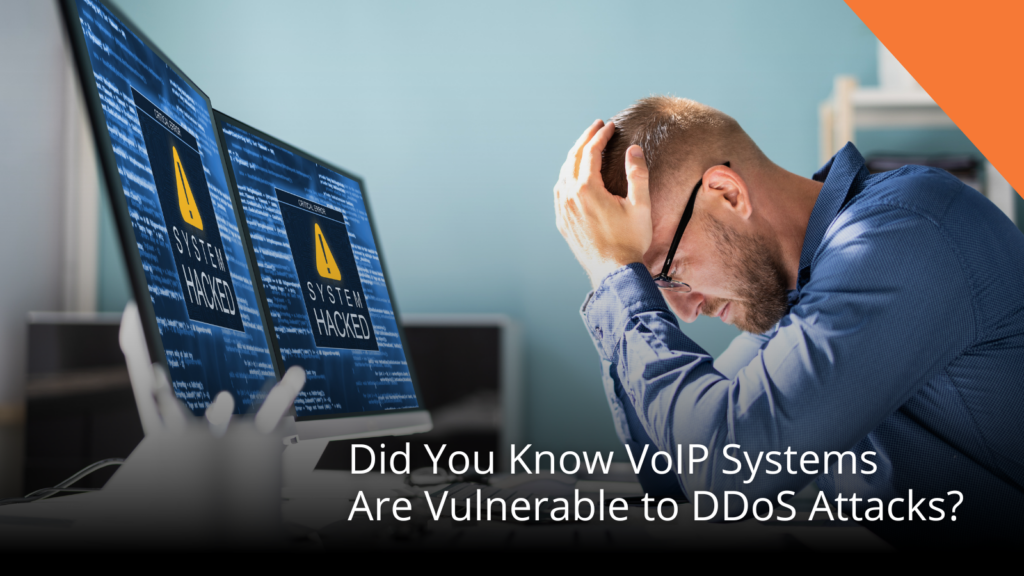Did You Know: VoIP Systems Are Vulnerable to DDoS Attacks? Here is How to Defend Against Them

It seems like everywhere we turn there are new threats, new warnings, and new ways cyber attackers are attempting to steal our data and break into our systems. Sadly, this is most likely only going to get worse with technology making advances every day and the addition of AI. Will the robots soon take over? Maybe. However, for now, we need to be aware that every type of technology is susceptible to cyber threats, including VoIP Systems. Let’s explore how VoIP systems are vulnerable to DDoS attacks and what you can do to prepare.
Why Are VoIP Systems Vulnerable to DDoS Attacks?
VoIP systems use the internet to transmit voice data packets in real-time, which makes them sensitive to any interruptions in network performance. During a DDoS attack, attackers flood the network with excessive traffic, causing service degradation or complete failure. Here are a few reasons why VoIP systems are particularly vulnerable:
Bandwidth Sensitivity: VoIP relies on stable and sufficient bandwidth to ensure clear voice communication. DDoS attacks can overwhelm your available bandwidth, causing dropped calls, poor audio quality, or even complete service outages.
Session Initiation Protocol (SIP) Weaknesses: SIP is widely used in VoIP systems to initiate and manage voice sessions. Attackers exploit weaknesses in SIP protocols, sending malformed or excessive requests that overload the system.
Publicly Accessible Networks: VoIP systems often operate over public internet connections, which means they can be exposed to external threats without proper security measures in place.
The Impact of DDoS Attacks on VoIP
A successful DDoS attack can have severe consequences on a business’s VoIP system, including:
- Disruption of communication: DDoS attacks can cripple your phone lines, causing communication breakdowns and loss of productivity.
- Financial losses: Extended downtime can lead to missed business opportunities, lost revenue, and potential reputational damage.
- Increased vulnerability: While VoIP systems are under attack, other vulnerabilities could be exploited, opening the door for further breaches like data theft.
How to Defend Your VoIP System Against DDoS Attacks
Now that we’ve established how dangerous DDoS attacks can be for your VoIP system, let’s dive into how you can protect your business from these threats.
Deploy a Session Border Controller (SBC)
An SBC acts as a security gateway between your VoIP network and external traffic. It filters out malicious traffic, ensuring that only legitimate requests reach your VoIP system. By monitoring and controlling the flow of traffic, SBCs help mitigate DDoS attacks and protect the integrity of your voice communication system.
Implement Bandwidth Management
To protect your VoIP system from getting overwhelmed, implement bandwidth management tools that prioritize VoIP traffic. This ensures that essential voice communication gets the bandwidth it needs, even during high traffic loads, reducing the risk of service disruption.
Use VoIP-Specific Firewalls
While traditional firewalls offer some protection, VoIP-specific firewalls are optimized to detect and block SIP-based threats. These firewalls are designed to handle the unique traffic patterns of VoIP systems, filtering out malicious requests that could compromise your network.
Monitor Network Traffic
Proactively monitoring your network traffic can help you detect unusual activity before it escalates into a full-blown attack. By setting up alerts for abnormal traffic spikes, you can quickly identify and respond to potential DDoS attacks before they cause major disruptions.
Set Up Redundancy
Building redundancy into your VoIP network can minimize the impact of DDoS attacks. By having backup servers or multiple VoIP providers, you can ensure that your business communications remain functional even if one system is compromised.
Work with a Secure VoIP Provider
Partnering with a secure VoIP service provider that offers DDoS protection can be one of the most effective ways to safeguard your system. Many VoIP providers have built-in security features, such as DDoS mitigation and traffic filtering, to keep your communications secure.
More Resources for You
DDoS Attacks: The Dominant Frontier of VoIP Attackers
Secure Your VoIP Communications Against Cyber Threats
VoIP systems are powerful tools for modern businesses, but they also come with risks, including vulnerability to DDoS attacks. By understanding these risks and taking proactive steps to secure your network, you can protect your VoIP system from disruption and ensure your business stays connected. Whether it’s deploying SBCs, using VoIP-specific firewalls, or working with a secure VoIP provider, defending against DDoS attacks requires a comprehensive approach to network security.Don’t wait until your VoIP system is compromised. Start implementing these defenses today and ensure your communication channels remain reliable and secure. If you have any questions or comments you can leave them below, chat with one of our VoIP Experts at www.voipsupply.com, or call us at 1-800-398-8647.